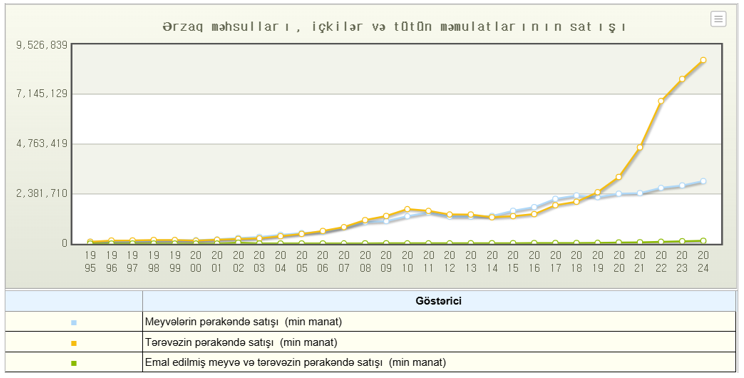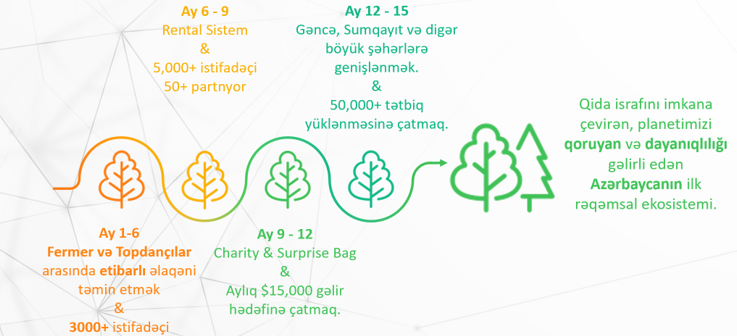GreeNight: Transforming Today's Waste into Tomorrow's Opportunity

The Global Crisis & The Local Impact
Food waste is one of the most critical and complex challenges facing the planet, impacting climate, resources, and economic stability. Globally, food loss and waste cost the world economy an estimated $1.1 Trillion annually. This waste is responsible for significant damage to the ozone layer and contributes to the depletion of scarce resources, notably freshwater reserves. The local impact is staggering: in Azerbaijan alone, an estimated 2.2 billion AZN worth of food is wasted yearly. This waste not only harms the environment but also significantly raises food prices, hurting family budgets by 5-7% and exacerbating food insecurity for the 733 million people globally who suffer from hunger every day.
GreeNight is Azerbaijan’s pioneering digital ecosystem dedicated to transforming this crisis into a sustainable opportunity. Our vision is to create a seamless, digitized supply chain that drastically reduces food loss by connecting surplus inventory from businesses directly to consumers at discounted prices, thereby delivering measurable ecological and economic benefits.

How it Works: A Sustainable, Profitable Platform
GreeNight operates as an ecological and economic platform focused on minimizing food waste by intelligently rerouting surplus products to consumers. The system creates a profitable, sustainable model by capturing value from food that would otherwise be discarded.
The core solution relies on a robust, multi-tiered system:
- B2B System Integration: GreeNight establishes direct partnerships with key food actors, including supermarkets, restaurants, and individual vendors. This B2B integration allows for the efficient identification and listing of products nearing their expiration or "best by" date.
- Discounted Consumer Access: Surplus products are offered to consumers at significantly reduced prices, creating a financial incentive for sustainable purchasing. This approach not only provides affordable food options but also reduces the financial burden of waste for partner businesses.
- Streamlined Logistics: The platform includes an efficient logistics layer that facilitates the seamless delivery of these discounted products to buyers, ensuring the timely distribution of perishable goods and maximizing product utilization.
- Ecosystem Expansion: GreeNight’s roadmap includes future scaling through a Rental System for partner equipment and the implementation of Charity & Surprise Bag initiatives, further increasing its ecological and social impact while generating sustainable monthly revenue targets (e.g., $15,000 monthly).
Strategic Advantages & Market Potential
GreeNight is positioned to be the first comprehensive digital solution of its kind in the regional market, offering a unique value proposition that satisfies both ecological and economic demands. The platform’s ability to turn waste into revenue gives it a powerful argument for partnership with food retailers. By mitigating just 1% of food waste in Azerbaijan, an estimated 20 million AZN in savings can be achieved annually, highlighting the immense economic potential of the service. GreeNight is not just a marketplace; it’s an investment in planetary sustainability that offers a strong return.

Sustainable Development Goal (SDG) Alignment
GreeNight’s foundational mission directly addresses multiple core UN Sustainable Development Goals:
- SDG 2: Zero Hunger: By preventing food from being wasted and rerouting it to consumers at lower prices, GreeNight increases the availability of food and helps ensure that more people have access to safe, nutritious, and sufficient food, thereby contributing to ending hunger and achieving food security.
- SDG 12: Responsible Consumption and Production: This is the primary alignment. GreeNight is a practical mechanism for halving per capita global food waste at the retail and consumer levels and reducing food losses along production and supply chains, including post-harvest losses. The platform promotes resource efficiency and responsible consumption patterns.
- SDG 13: Climate Action: Given that food waste is a significant contributor to greenhouse gas emissions, reducing this waste helps mitigate the overall carbon footprint of the food system. By keeping perishable goods out of landfills, GreeNight supports urgent action to combat climate change and its environmental impacts.
The development of GreeNight: Transforming Today's Waste into Tomorrow's Opportunity was significantly grounded by the technical support and mentorship provided by the faculty of the Department of Electronics Engineering. Their specialized knowledge in areas such as IoT (Internet of Things) integration, real-time sensor networking, and power-efficient system design was crucial. This expertise was essential for building the robust and scalable digital ecosystem, ensuring the seamless, reliable tracking and rerouting of surplus inventory, from point of origin to the consumer, to effectively minimize food waste.